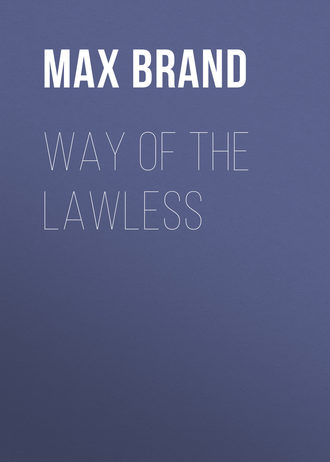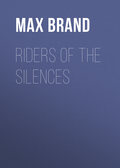
Макс Брэнд
Way of the Lawless
CHAPTER 22
If only the night had been dark, if the gelding had had a fair start; but the moon was bright, and in the thin mountain air it made a radiance almost as keen as day and just sufficiently treacherous to delude a horse, which had been sent unexpectedly out among rocks by a cruel pair of spurs. At the end of the first leap the gelding stumbled to his knees with a crash and snort among the stones. The shock hurled Andrew forward, but he clung with spurs and hand, and as he twisted back into the saddle the gelding rose valiantly and lurched ahead again.
Yet that double sound might have roused an army, and for the keen-eared watchers around the clearing it was more than an ample warning. There was a crash of musketry so instant and so close together that it was like a volley delivered by a line of soldiers at command. Bullets sang shrill and small around Andrew, but that first discharge had been a burst of snap-shooting, and by moonlight it takes a rare man indeed to make an accurate snapshot. The first discharge left both Andrew and the horse untouched, and for the moment the wild hope of unexpected success was raised in his heart. And he had noted one all-important fact—the flashes, widely scattered as they were, did not extend across the exact course of his flight toward the trees. Therefore, none of the posse would have a point-blank shot at him. For those in the rear and on the sides the weaving course of the gelding, running like a deer and swerving agilely among the rocks, as if to make up for his first blunder, offered the most difficult of all targets.
All this in only the space of a breath, yet the ground was already crossed and the trees were before him when Andrew saw a ray of moonlight flash on the long barrel of rifle to his right, and he knew that one man at least was taking a deliberate aim. He had his revolver on the fellow in the instant, and yet he held his fire. God willing, he would come back to Anne Withero with no more stains on his hands!
And that noble, boyish impulse killed the chestnut, for a moment later a stream of fire spouted out, long and thin, from the muzzle of the rifle, and the gelding struck at the end of a stride, like a ship going down in the sea; his limbs seemed to turn to tallow under him, and he crumpled on the ground.
The fall flung Andrew clean out of the saddle; he landed on his knees and leaped for the woods, but now there was a steady roar of guns behind him. He was struck heavily behind the left shoulder, staggered. Something gashed his neck like the edge of a red-hot knife, his whole left side was numb.
And then the merciful dark of the trees closed around him.
For fifty yards he raced through an opening in the trees, while a yelling like wild Indians rose behind him; then he leaped into cover and waited. One thing favored him still. They had not brought horses, or at least they had left their mounts at some distance, for fear of the chance noises they might make when the cabin was stalked. And now, looking down the lane among the trees, he saw men surge into it.
All his left side was covered with a hot bath, but, balancing his revolver in his right hand, he felt a queer touch of joy and pride at finding his nerve still unshaken. He raised the weapon, covered their bodies, and then something like an invisible hand forced down the muzzle of his gun. He could not shoot to kill!
He did what was perhaps better; he fired at that mass of legs, and even a child could not have failed to strike the target. Once, twice, and again; then the crowd melted to either side of the path, and there was a shrieking and forms twisting and writhing on the ground.
Some one was shouting orders from the side; he was ordering them to the right and left to surround the fugitive; he was calling out that Lanning was hit. At least, they would go with caution down his trail after that first check. He left his sheltering tree and ran again down the ravine.
By this time the first shock of the wounds and the numbness were leaving him, but the pain was terrible. Yet he knew that he was not fatally injured if he could stop that mortal drain of his wounds.
He heard the pursuit in the distance more and more. Every now and then there was a spasmodic outburst of shooting, and Andrew grinned in spite of his pain. They were closing around the place where they thought he was making his last stand, shooting at shadows which might be the man they wanted.
Then he stopped, tore off his shirt, and ripped it with his right hand and his teeth into strips. He tied one around his neck, knotting it until he could only draw his breath with difficulty. Several more strips he tied together, and then wound the long bandage around his shoulder and pulled. The pain brought him close to a swoon, but when his senses cleared he found that the flow from his wounds had eased.
But not entirely. There was still some of that deadly trickling down his side, and, with the chill of the night biting into him, he knew that it was life or death to him if he could reach some friendly house within the next two miles. There was only one dwelling straight before him, and that was the house of the owner of the bay mare. They would doubtless turn him over to the posse instantly. But there was one chance in a hundred that they would not break the immemorial rule of mountain hospitality. For Andrew there was no hope except that tenuous one.
The rest of that walk became a nightmare. He was not sure whether he heard the yell of rage and disappointment behind him as the posse discovered that the bird had flown or whether the sound existed only in his own ringing head. But one thing was certain—they would not trail Andrew Lanning recklessly in the night, not even with the moon to help them.
So he plodded steadily on. If it had not been for that ceaseless drip he would have taken the long chance and broken for the mountains above him, trying through many a long day ahead to cure the wounds and in some manner sustain his life. But the drain continued. It was hardly more than drop by drop, but all the time a telltale weakness was growing in his legs. In spite of the agony he was sleepy, and he would have liked to drop on the first mat of leaves that he found.
That crazy temptation he brushed away, and went on until surely, like a star of hope, he saw the light winking feebly through the trees, and then came out on the cabin.
He remembered afterward that even in his dazed condition he was disappointed because of the neat, crisp, appearance of the house. There must be women there, and women meant screams, horror, betrayal.
But there was no other hope for him now. Twice, as he crossed the clearing before he reached the door of the cabin, his foot struck a rock and he pitched weakly forward, with only the crumbling strength of his right arm to keep him from striking on his face. Then there was a furious clamor and a huge dog rushed at him.
He heeded it only with a glance from the corner of his eye. And then, his dull brain clearing, he realized that the dog no longer howled at him or showed his teeth, but was walking beside him, licking his hand and whining with sympathy. He dropped again, and this time he could never have regained his feet had not his right arm flopped helplessly across the back of the big dog, and the beast cowered and growled, but it did not attempt to slide from under his weight.
He managed to get erect again, but when he reached the low flight of steps to the front door he was reeling drunkenly from side to side. He fumbled for the knob, and it turned with a grating sound.
"Hold on! Keep out!" shrilled a voice inside. "We got guns here. Keep out, you dirty bum!"
The door fell open, and he found himself confronted by what seemed to him a dazzling torrent of light and a host of human faces. He drew himself up beside the doorway.
"Gentlemen," said Andrew, "I am not a bum. I am worth five thousand dollars to the man who turns me over, dead or alive, to the sheriff. My name is Andrew Lanning."
At that the faces became a terrible rushing and circling flare, and the lights went out with equal suddenness. He was left in total darkness, falling through space; but, at his last moment of consciousness, he felt arms going about him, arms through which his bulk kept slipping down, and below him was a black abyss.
CHAPTER 23
It was a very old man who held, or tried to hold, Andrew from falling to the floor. His shoulders shook under the burden of the outlaw, and the burden, indeed, would have slumped brutally to the floor, had not the small ten-year-old boy, whom Andrew had seen on the bay mare, come running in under the arms of the old man. With his meager strength he assisted, and the two managed to lower the body gently.
The boy was frightened. He was white at the sight of the wounds, and the freckles stood out in copper patches from his pallor.
Now he clung to the old man.
"Granddad, it's the gent that tried to buy Sally!"
The old man had produced a murderous jackknife with a blade that had been ground away to the disappearing point by years of steady grinding.
"Get some wood in the stove," he commanded. "Fire her up, quick. Put on some water. Easy, lad!"
The room became a place of turmoil with the clatter of the stove lids being raised, the clangor of the kettle being filled and put in place. By the time the fire was roaring and the boy had turned, he found the bandages had been taken from the body of the stranger and his grandfather was studying the smeared naked torso with a sort of detached, philosophic interest. With the thumb and forefinger of his left hand he was pressing deeply into the left shoulder of Andrew.
"Now, there's an arm for you, Jud," said the old man. "See them long, stringy muscles in the forearm? If you grow up and have muscles like them, you can call yourself a man. And you see the way his stomach caves in? Aye, that's a sign! And the way his ribs sticks out—and just feel them muscles on the point of his shoulder—Oh, Jud, he would of made a prime wrestler, this fine bird of ours!"
"It's like touchin' somethin' dead, granddad," said the boy. "I don't dast to do it!"
"Jud, they's some times when I just about want to give you up! Dead? He ain't nowheres near dead. Just bled a bit, that's all. Two as pretty little wounds as was ever drilled clean by a powerful rifle at short range. Dead? Why, inside two weeks he'll be fit as a fiddle, and inside a month he'll be his own self! Dead! Jud, you make me tired! Gimme that water."
He went to work busily. Out of a sort of first-aid chest he took homemade bandages and, after cleansing the wounds, he began to dress them carefully.
He talked with every movement.
"So this here is the lion, is it?" nodded granddad. "This here is the ravenin', tearin', screechin' man-eater? Why, he looks mostly plain kid to me."
"He—he's been shot, ain't he, granddad?" asked the child in a whisper.
"Well, boy, I'd say that the lion had been chawed up considerable—by dogs."
He pointed. "See them holes? The big one in front? That means they sneaked up behind him and shot him while his back was turned."
"He's wakin' up, granddad," said Jud, more frightened than before.
The eyes of Andrew were indeed opening.
He smiled up at them. "Uncle Jas," he said, "I don't like to fight. It makes me sick inside, to fight." He closed his eyes again.
"Now, now, now!" murmured Pop. "This boy has a way with him. And he killed Bill Dozier, did he? Son, gimme the whisky."
He poured a little down the throat of the wounded man, and Andrew frowned and opened his eyes again: He was conscious at last.
"I think I've seen you before," he said calmly. "Are you one of the posse?"
The old man stiffened a little. A spot of red glowed on his withered cheek and went out like a snuffed light.
"Young feller," said the old man, "when I go huntin' I go alone. You write that down in red, and don't forget it. I ain't ever been a member of no posse. Look around and see yourself to home."
Andrew raised his head a little and made out the neat room. It showed, as even his fading senses had perceived when he saw the house first, a touch of almost feminine care. The floor was scrubbed to whiteness, the very stove was burnished.
"I remember," said Andrew faintly.
"You did see me before," said the other, "when you rode into Tomo. I seen you and you seen me. We changed looks, so to speak. And now you've dropped in to call on me. I'm goin' to put you up in the attic. Gimme a hand to straighten him up, Jud."
With Jud's help and the last remnant of Andrew's strength they managed to get him to his feet, and then he partly climbed, partly was pushed by Jud, and partly was dragged by the old man up a ladder to the loft. It was quite cool there, very dark, and the air came in through two windows.
"Ain't very sociable to put a guest in the attic," said Pop, between his panting breaths. "But a public character like you, Lanning, will have a consid'able pile of callers askin' after you. Terrible jarrin' to the nerves when folks come in and call on a sick man. You lie here and rest easy."
He went down the ladder and came back dragging a mattress. There, by the light of a lantern, he and Jud made Andrew as comfortable as possible.
"You mean to keep me here?" asked the outlaw.
"Long as you feel like restin'," answered the old man.
"You can make about—"
"Stop that fool talk about what I can make out of you. How come it you stayed so close to Tomo? Where was you lyin' low? In the hills?"
"Not far away." "And they smelled you out?"
"A man I thought was my friend—" Andrew clicked his teeth shut.
"You was sold, eh?"
"I made a mistake."
"H'm," was the other's comment. "Well, you forget about that and go to sleep. I got a few little attentions to pay to that posse. It'll be here r'arin' before tomorrer. Sleep tight, partner."
He climbed down the ladder and looked around the room. Jud, his freckles still looking like spots of mud or rust, his eyes popping, stood silent.
"I'm glad of that," said the old man, with a sigh.
"What, granddad?"
"You're like a girl, Jud. Takes a sight to make you reasonable quiet. But look yonder. Them spots look tolerable like red paint, don't they? Well, we got to get 'em off."
"I'll heat some more water," suggested Jud.
"You do nothing of the kind. You get them two butcher knives out of the table drawer and we'll scrape off the wood, because you can't wash that stain out'n a floor." He looked suddenly at Jud with a glint in his eyes. "I know, because I've tried it."
For several minutes they scraped hard at the floor until the last vestige of the fresh stains was gone. Then the old man went outside and, coming back with a handful of sand, rubbed it in carefully over the scraped places. When this was swept away the floor presented no suspicious traces.
"But," he exclaimed suddenly, "I forgot. I plumb forgot. He's been leakin' all the way here, and when the sun comes up they'll foller him that easy by the sign. Jud, we're beat!"
They dropped, as at a signal, into two opposite chairs, and sat staring gloomily at each other. The old man looked simply sad and weary, but the color came and went in the face of Jud. And then, like a light, an idea dawned in the face of the child. He got up from his chair, lighted a lantern, and went outside. His grandfather observed this without comment or suggestion, but, when Jud was gone, he observed to himself: "Jud takes after me. He's got thoughts. And them was things his ma and pa was never bothered with."
CHAPTER 24
The thought of Jud now took him up the back trail of Andrew Lanning. He leaned far over with the lantern, studying with intense interest every place where the wounds of the injured man might have left telltale stains on the rocks or the grass. When he had apparently satisfied himself of this, he turned and ran at full speed back to the house and went up the ladder to Andrew. There he took the boots—they were terribly stained, he saw—and drew them on.
The loose boots and the unaccustomed weights tangled his feet sadly, as he went on down the ladder, but he said not a word to his grandfather, who was far too dignified to make a comment on the borrowed footgear.
Again outside with his lantern, the boy took out his pocket-knife and felt the small blade. It was of a razor keenness. Then he went through the yard behind the house to the big henhouse, where the chickens sat perched in dense rows. He raised his lantern; at once scores of tiny, bright eyes flashed back at him.
But Jud, with a twisted face of determination, kept on with his survey until he saw the red comb and the arched tail plumes of a large Plymouth Rock rooster.
It was a familiar sight to Jud. Of all the chickens on the place this was his peculiar property. And now he had determined to sacrifice this dearest of pets.
The old rooster was so accustomed to his master, indeed, that he allowed himself to be taken from the perch without a single squawk, and the boy took his captive beyond the pen. Once, when the big rooster canted his head and looked into his face, the boy had to wink away the tears; but he thought of the man so near death in the attic, he felt the clumsy boots on his feet, and his heart grew strong again.
He went around to the front of the house and by the steps he fastened on the long neck of his prisoner a grasp strong enough to keep him silent for a moment. Then he cut the rooster's breast deeply, shuddering as he felt the knife take hold.
Something trickled warmly over his hands. Dropping his knife in his pocket, Jud started, walked with steps as long as he could make them. He went, with the spurs chinking to keep time for each stride, straight toward a cliff some hundreds of yards from the house. The blood ran freely. The old rooster, feeling himself sicken, sank weakly against the breast of the boy, and Jud thought that his heart would break. He reached the sharp edge of the cliff and heard the rush of the little river far below him. At the same time his captive gave one final flutter of the wings, one feeble crow, and was dead.
Jud waited until the tears had cleared from his eyes. Then he took off the boots, and, in bare feet that would leave no trace on the rocks, he skirted swiftly back to the house, put the dead body back in the chicken yard, and returned to his grandfather.
There was one great satisfaction for him that evening, one reward for the great sacrifice, and it came immediately. While the old man stood trembling before him, Jud told his story.
It was a rich feast indeed to see the relief, the astonishment, the pride come in swift turns upon that grim old face.
And yet in the end Pop was able to muster a fairly good imitation of a frown.
"And here you come back with a shirt and a pair of trousers plumb spoiled by all your gallivantin'," he said, "not speakin' of a perfectly good chicken killed. Ain't you never goin' to get grown up, Jud?"
"He was mine, the chicken I killed," said Jud, choking.
It brought a pause upon the talk. The other was forced to wink both eyes at once and sigh.
"The big speckled feller?" he asked more gently.
"The Plymouth Rock," said Jud fiercely. "He wasn't no speckled feller! He was the finest rooster and the gamest—"
"Have it your own way," said the old man. "You got your grandma's tongue when it comes to arguin' fine points. Now go and skin out of them clothes and come back and see that you've got all that—that stuff of'n your face and hands."
Jud obeyed, and presently reappeared in a ragged outfit, his face and hands red from scrubbing.
"I guess maybe it's all right," declared the old man. "Only, they's risks in it. Know what's apt to happen if they was to find that you'd helped to get a outlaw off free?"
"What would it be?" asked the boy.
"Oh, nothin' much. Maybe they'd try you and maybe they wouldn't. Anyways, they'd sure wind up by hangin' you by the neck till you was as dead as the speckled rooster."
"The Plymouth Rock," insisted Jud hotly.
"All right, I don't argue none. But you just done a dangerous thing, Jud. And there'll be a consid'able pile of men here in the mornin', most like, to ask you how and why."
He was astonished to hear Jud break into laughter.
"Hush up," said Pop. "You'll be wakin' him up with all that noise. Besides, what d'you mean by laughin' at the law?" "Why, granddad," said Jud, "don't I know you wouldn't never let no posse take me from you? Don't I know maybe you'd clean 'em all up?"
"Pshaw!" said Pop, and flushed with delight. "You was always a fool kid, Jud. Now you run along to bed."






